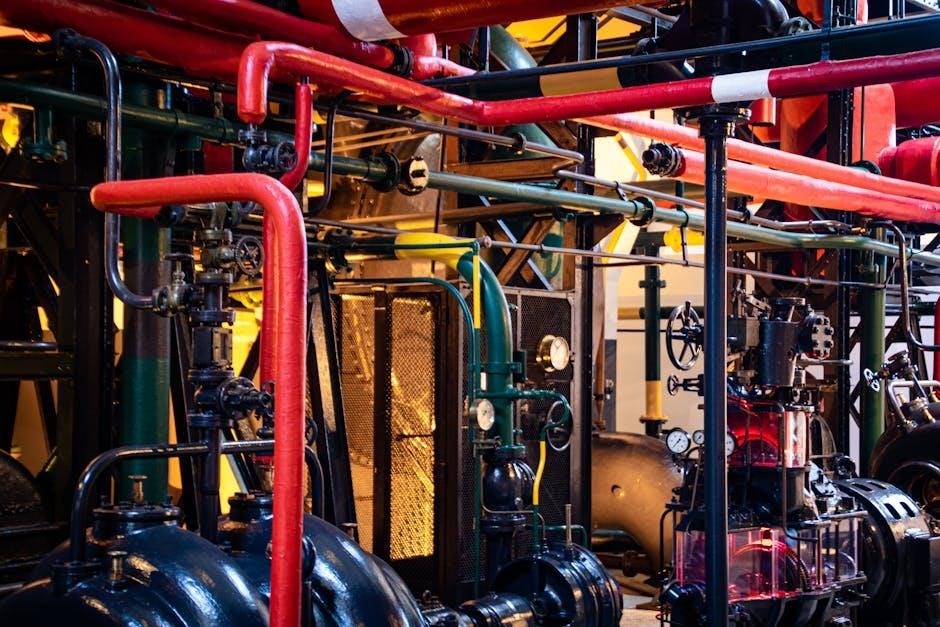Mechanical engineering PDFs are essential resources for students and professionals‚ offering in-depth coverage of key topics like thermodynamics‚ design‚ and manufacturing. They provide accessible learning and reference materials.
1.1 Overview of Mechanical Engineering Resources
Mechanical engineering resources encompass a wide range of materials‚ including textbooks‚ handbooks‚ and reference books. These resources cover foundational topics like thermodynamics‚ fluid mechanics‚ and design‚ as well as advanced areas such as mechatronics and automation. Many of these materials are available in PDF format‚ making them easily accessible for students and professionals. Websites like freepdfbook.com and EngineeringHulk offer free eBooks on mechanical engineering‚ while platforms like Google Drive and InfoBooks provide downloadable content. These resources often include detailed explanations‚ diagrams‚ and problem-solving methodologies‚ ensuring comprehensive learning and reference. They cater to both academic and practical applications‚ supporting mechanical engineers in their studies and professional development.
1.2 Importance of PDF Materials in Engineering Education
PDF materials play a vital role in engineering education due to their accessibility and convenience. They provide students with concise‚ organized‚ and easily searchable content‚ essential for quick reference. PDFs often include visual aids like diagrams and charts‚ enhancing understanding of complex topics. They are also cost-effective‚ reducing financial barriers for learners. Additionally‚ PDFs are compatible with various devices‚ allowing anytime‚ anywhere access. This format supports self-paced learning and serves as a valuable resource for both theoretical and practical applications. The availability of PDF materials ensures that mechanical engineering students and professionals can efficiently access and utilize critical information‚ fostering academic and professional growth.

Free Mechanical Engineering Books and Resources

Free mechanical engineering PDF books and resources are widely available‚ covering topics like thermodynamics‚ fluid mechanics‚ and design. They are essential for students and professionals alike.
2.1 Top Recommended PDF Books for Mechanical Engineers
Top recommended PDF books for mechanical engineers include “Mechanical Engineers’ Handbook” and “Heat and Mass Transfer” by S. Incropera. These resources are comprehensive and cover key topics like thermodynamics and fluid mechanics‚ providing detailed insights for both students and professionals. They are widely recognized for their clarity and depth‚ making them invaluable for academic and practical applications in the field of mechanical engineering. These books are available online for free‚ ensuring accessibility for learners worldwide.
2.2 Websites Offering Free Mechanical Engineering E-books
Websites like freepdfbook.com and EngineeringHulk provide free mechanical engineering e-books in PDF format. These platforms offer a wide range of resources‚ including textbooks‚ handbooks‚ and reference materials on topics such as thermodynamics‚ fluid mechanics‚ and design. Users can access books like “Heat and Mass Transfer” by S. Incropera and “Mechanical Engineers’ Handbook” for free. Additionally‚ some books are available through Google Drive links‚ making it easy for students and professionals to download and study. These websites are invaluable for those seeking affordable and accessible learning materials in mechanical engineering.
2.3 Open-Source Textbooks for Mechanical Engineering Students
Open-source textbooks are a valuable resource for mechanical engineering students‚ offering free and customizable learning materials. Platforms like OpenStax and Project Gutenberg provide access to high-quality textbooks on topics such as thermodynamics‚ mechanics‚ and design. These textbooks are often peer-reviewed and designed to align with standard curriculum requirements. They are particularly beneficial for students who cannot afford traditional textbooks‚ as they eliminate financial barriers to education. Open-source materials also allow instructors to modify content to suit specific course needs‚ fostering a more interactive and tailored learning experience. This approach promotes accessibility and innovation in mechanical engineering education‚ ensuring that knowledge is shared widely and equitably.

Key Topics in Mechanical Engineering PDFs
Mechanical engineering PDFs cover essential topics like thermodynamics‚ fluid mechanics‚ and mechanical design‚ providing foundational knowledge and practical applications for students and professionals in the field.
3.1 Fundamentals of Thermodynamics

Thermodynamics is a core topic in mechanical engineering‚ focusing on energy‚ heat transfer‚ and work. PDF resources explore laws of thermodynamics‚ entropy‚ and energy conversion processes. These materials are crucial for understanding how energy interacts with physical systems‚ from internal combustion engines to refrigeration cycles. Key concepts include the first law of thermodynamics‚ which deals with energy conservation‚ and the second law‚ which introduces entropy. These principles are essential for designing efficient systems and solving real-world engineering problems. Mechanical engineering PDFs often include detailed explanations‚ equations‚ and practical examples to help students grasp these fundamental concepts.
3.2 Principles of Fluid Mechanics
Fluid mechanics is a foundational area of mechanical engineering‚ focusing on the behavior of fluids under various conditions. PDF resources delve into principles such as fluid statics‚ dynamics‚ and the properties of fluids like viscosity and density. Key topics include Bernoulli’s equation‚ the Reynolds number‚ and fluid flow regimes. These resources also explore practical applications‚ such as pipe flow‚ turbulence‚ and hydraulic systems. Mechanical engineering PDFs often include detailed diagrams and problem-solving techniques to help students and professionals understand fluid behavior. Textbooks like Fluid Mechanics by Yunus Cengel and Fluid Mechanics by Frank White are widely referenced for their comprehensive coverage of the subject.

3.3 Mechanical Design and Manufacturing Processes
Mechanical design and manufacturing processes are crucial for creating efficient and innovative products. PDF resources cover design principles‚ including material selection‚ CAD‚ and DFSS. Manufacturing processes like machining‚ casting‚ and 3D printing are detailed. These materials are essential for understanding the lifecycle of product development‚ from concept to production. They also emphasize sustainability and cost-effectiveness in modern manufacturing. Textbooks and handbooks provide practical examples and exercises to aid engineers in applying these concepts effectively.

Advanced Topics in Mechanical Engineering PDFs
Advanced mechanical engineering PDFs explore complex subjects like heat transfer‚ solids mechanics‚ and mechatronics. These resources cater to professionals and students seeking in-depth knowledge and practical applications.
4.1 Heat and Mass Transfer
Heat and mass transfer are fundamental concepts in mechanical engineering‚ crucial for designing efficient systems. PDF resources cover conduction‚ convection‚ and radiation‚ offering detailed problem-solving techniques and real-world applications. These materials are essential for both students and professionals‚ providing comprehensive insights into thermal management and system optimization.
4.2 Mechanics of Solids and Materials Science
Mechanics of solids and materials science are critical in understanding the behavior of materials under stress‚ strain‚ and other external forces. PDF resources explore fundamental concepts like elasticity‚ plasticity‚ and failure theories‚ providing insights into material properties and structural integrity. These materials also delve into advanced topics such as composite materials‚ fracture mechanics‚ and fatigue analysis. By studying these resources‚ engineers can design safer‚ more durable structures and components. The content is supported by case studies‚ mathematical models‚ and practical applications‚ making it invaluable for both academic and professional development in mechanical engineering.

4.3 Mechatronics and Automation
Mechatronics and automation integrate mechanical systems with electronics‚ software‚ and control engineering to create intelligent systems. PDF resources on this topic explore the fundamentals of automation‚ including sensors‚ actuators‚ and programmable logic controllers (PLCs). These materials also cover advanced concepts like robotics‚ artificial intelligence‚ and IoT applications in mechanical engineering. Students and professionals can learn how to design and optimize automated systems‚ improving efficiency and precision in industries such as manufacturing‚ automotive‚ and aerospace. The content often includes practical examples‚ case studies‚ and tutorials‚ making it a valuable resource for understanding modern automation techniques and their implementation in real-world scenarios.